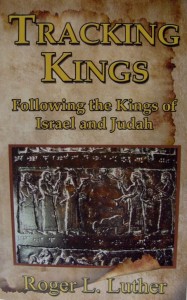 Chapter 7 – “A Stone of a Lasting Standard” – David (reign -40 years – BC 1055–1015), pp 47-48
Chapter 7 – “A Stone of a Lasting Standard” – David (reign -40 years – BC 1055–1015), pp 47-48
…Shortly after David’s victory over the Amalekites, a desperate Amalekite came to Ziklag and was granted permission to approach David with news of Saul and Jonathan’s death. Believing that he was doing David a favor, he announced that he had assisted King Saul in ending his life on the battlefield. Even though the stranger had handed David Saul’s crown and bracelet, the entire story had been fabricated. In reality Saul had taken his own life (ISam.31:4) and the Amalekite had evidentially arrived on the battlefield after the fact. David was perplexed as to why the stranger seemed to possess no fear of falling on God’s anointed. Due to David’s high regard for Saul’s position and the death of his dear son, he had the man executed and then spent time grieving over the deaths of the king and Jonathan. After his time of lamenting, “…he bade them teach the children of Judah [the use of] the bow: behold, [it is] written in the book of Jasher” (ISam.1:18). The death of Saul and Jonathan appears to have triggered David’s memory of this ancient work.1 David sought God and was told to go up to Hebron (community). Upon arriving at Hebron anxious leaders soon acknowledged David as Israel’s new king.
From our perspective of David’s family in Hebron it appears to be anything but ordinary. The Bible does not hesitate in introducing us to David’s six wives and sons – all living in Hebron: (1) Ammon (faithful) by Ahinoam the Jezreelitess, (2) Chileab (restraint) of Abigail, (3) Absalom (father of peace) by Maacah (oppression), (4) Adonijah (my lord is Jehovah) by Haggith (festive), (5) Shephatiah (Jehovah judges) by Abital (fresh), and (6) Ithream (residue of the people) by Eglah (heifer).2 (IISam.3:2–5)
corresponding end notes for above (pp 403-404)
- The mention of this book in itself is most interesting. (1st) It has historical significance, even though it is not part of our inspired text. (2nd) It is mentioned here and in Joshua 10:12–13. (3rd) The title of the book, Jasher, is not a proper name (such as the name of a man) rather, it basically means the book of the upright, or righteous man, or the acts of true Godly people following God. (4th) This book of many writers is a vast collection (91 chapters) of about 90% Scripture covering a period of time from Adam through the Judges. It was a kind of secular chronicle of a major section of Old Testament history. (5th) In our text at hand David is referring to the dying words of Jacob to Judah. In Jasher 56:9 we read, “…only teach thy sons the use of the bow and all weapons of war, in order that they may fight the battles of their brother who will rule over their enemies.” One has to certainly admit that King David was very familiar with the book of Jasher.
- Old Testament polygamy appears to have been something God tolerated rather than endorsed. Note the following prophetic passage which foretells of Israel’s desire for a king and its associated warnings:
When thou art come unto the land which the LORD thy God giveth thee, and shalt possess it, and shalt dwell therein, and shalt say, I will set a king over me, like as all the nations that [are] about me; 15 Thou shalt in any wise set [him] king over thee, whom the LORD thy God shall choose: [one] from among thy brethren shalt thou set king over thee: thou mayest not set a stranger over thee, which [is] not thy brother. 16 But he shall not multiply horses to himself, nor cause the people to return to Egypt, to the end that he should multiply horses: forasmuch as the LORD hath said unto you, Ye shall henceforth return no more that way. 17 Neither shall he multiply wives to himself, that his heart turn not away: neither shall he greatly multiply to himself silver and gold.” (Deu.17:14–17) In the new Testament we read: “And he answered and said unto them, Have ye not read, that he which made [them] at the beginning made them male and female, 5 And said, For this cause shall a man leave father and mother, and shall cleave to his wife: and they twain shall be one flesh? 6 Wherefore they are no more twain, but one flesh. What therefore God hath joined together, let not man put asunder. 7 They say unto him, Why did Moses then command to give a writing of divorcement, and to put her away? 8 He saith unto them, Moses because of the hardness of your hearts suffered you to put away your wives: but from the beginning it was not so. (Mat.19:4–8)
Josephus remarked, “For it is an ancestral custom of ours to have several wives at the same time.” In paragraph 19 he recorded that King Herod was married to nine wives at the same time. (Op. cit., volume III, book 17, section 1, paragraph 3, p.472) Wherever we find polygamy we find trouble, confusion and, in the case of the Old Testament, hearts turned many directions away from God.
(pp50-51)
… Although outsiders may have seen David as being invincible, God quickly taught him that he was a sinner prone to sin just like all the rest of us. God exposed David’s sinful nature and actions to him through Nathan when Nathan addressed David’s affair with Bathsheba (IISam.11–12:7). David’s lament of this entire scenario can be found in Psalm 51. Before fast forwarding in David’s life, one quick observation of God’s revelation must be addressed: After the death of the infant child from this affair, listen to David’s God-given convictions, “But now he is dead, wherefore should I fast? can I bring him back again? I shall go to him, but he shall not return to me.” (IISam.12:23) Even way back we read of the innocence of children: Moreover your little ones, which ye said should be a prey, and your children, which in that day had no knowledge between good and evil, they shall go in thither, and unto them will I give it, and they shall possess it. (Deu.1:39).
There is no question but that God has special provision for the innocent children and this provision has the same destination as the redeemed adults!5
corresponding end note (pp 404-406)
- A wonderful study can be found in examining what God has to say about the “book”. Moses would pen –
And Moses returned unto the LORD, and said, Oh, this people have sinned a great sin, and have made them gods of gold. 32 Yet now, if thou wilt forgive their sin–; and if not, blot me, I pray thee, out of thy book which thou hast written. 33 And the LORD said unto Moses, Whosoever hath sinned against me, him will I blot out of my book. (Ex.32:31–33)
Under God’s guidance David would record –
For thou hast possessed my reins: thou hast covered me in my mother’s womb. 14 I will praise thee; for I am fearfully and wonderfully made: marvellous are thy works; and that my soul knoweth right well. 15 My substance was not hid from thee, when I was made in secret, and curiously wrought in the lowest parts of the earth. 16 Thine eyes did see my substance, yet being unperfect; and in thy book all my members were written, which in continuance were fashioned, when as yet there was none of them. (Psa.139:13–16)
In the New Testament God reveals additional information by using Paul and John.
And I intreat thee also, true yokefellow, help those women which laboured with me in the gospel, with Clement also, and with other my fellow labourers, whose names are in the book of life. (Phil.4:3)
He that overcometh, the same shall be clothed in white raiment; and I will not blot out his name out of the book of life, but I will confess his name before my Father, and before his angels. (Rev.3:5)
For whatsoever is born of God overcometh the world: and this is the victory that overcometh the world, [even] our faith. Who is he that overcometh the world, but he that believeth that Jesus is the Son of God? (IJn.5:4–5)
And all that dwell upon the earth shall worship him, whose names are not written in the book of life of the Lamb slain from the foundation of the world. (Rev.13:8)
The beast that thou sawest was, and is not; and shall ascend out of the bottomless pit, and go into perdition: and they that dwell on the earth shall wonder, whose names were not written in the book of life from the foundation of the world, when they behold the beast that was, and is not, and yet is. (Rev.17:8)
And I saw the dead, small and great, stand before God; and the books were opened: and another book was opened, which is the book of life: and the dead were judged out of those things which were written in the books, according to their works. 13 And the sea gave up the dead which were in it; and death and hell delivered up the dead which were in them: and they were judged every man according to their works. (Rev.20:12–13)
And there shall in no wise enter into it any thing that defileth, neither whatsoever worketh abomination, or maketh a lie: but they which are written in the Lamb’s book of life. (Rev.21:27)
And if any man shall take away from the words of the book of this prophecy, God shall take away his part out of the book of life, and out of the holy city, and from the things which are written in this book. (Rev.22:19)
Scripture teaches that at birth one’s name is placed in God’s special book. Unless this same soul dies in infancy (please note ISam.12:16–23), at some unknown point and age this same name is removed from God’s book because of that soul’s sin. Apart from God’s help, that same soul’s name is forbidden back into the book and will remain in said condition through out eternity. The only thing that can re-write that name back into God’s book is a personal cleansing and pardoning by God upon that same soul if and when that same soul personally hears about, believes upon, and trusts in the finished work of the Lord Jesus Christ. Based fully upon the merits of Christ, the name therefore remains in God’s book forever!
Availability
Although this publication is available from Amazon and Barns and Noble, may I suggest contacting me at Rllroger1948@gmail.com, roger@rogerluther.com, or feel free to call 810. 569.3327. Also, consider visiting the publisher’s web site. There you will discover an abundance books that will surely grab your attention, edify your soul, and lift up The Lord. pho. 864.836.4111 ext. 104 (the office)fax: 864.610.8047 sspillman@truepotentialmedia.com or https://www.facebook.com/TruePotentialMedia / or tppress.com /Digital copies are now available from the publisher, Amazon, or iTunes books. The cost is $9.99. Tracking Kings sells for $19.95+ S.&H.
God Bless,
Roger
Death-Of-A-Child.pdfft click to read or right click to download
